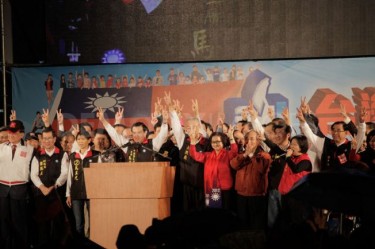Taiwan's presidential and legislative election was held on January 14, 2012. Incumbent Ma Ying-jeou of the Kuomintang (KMT) was reelected as President with 51.6% of the vote. Democratic Progressive Party (DPP) challenger Tsai Ing-wen resigned her post as chairperson of the DPP following her election defeat.
Chinese communities around the world were closely watching the results, as Taiwan is the first among the Chinese societies to transition from authoritarian to democratic governance. Many people from mainland China and Hong Kong travelled to Taiwan to observe the political process; they wonder if Taiwan can set an example for the future democratization in mainland China.

Ma Ying-jeou and his winning team giving the victory speech after the 2012 Taiwan elections. Image by Craig Ferguson, copyright © Demotix (14/01/12).
Beijing based journalist Mark MacKinnon was surprised by Taiwanese enthusiasm for politics:
As a Beijing correspondent, it's so weird to see and hear people talking and shouting – in Chinese – about politics.
Based on the website of the Central Election Commission, 74.38% of eligible voters casted their votes in 2012. Ma Ying-jeou won reelection with 51.60% of the total votes cast, and Tsai Ing-wen gathered 45.63%.
Taiwan sovereignty
Different from the previous election, the usual Blue (KMT) and Green (DDP) antagonism seems absent, yet Taiwanese sovereignty remains the most critical issue. Karlatheo expressed [zh] expressed her concern after the election:
1月14日,平靜地去投票。與朋友相聚。其實大家並不特別在意哪一黨得勝,但是很在意台灣的主體性是否會失落。…知道中國的因素主宰著這次的選舉,經濟的問題是所有的人都得面對的。…馬總統,請記得您是我們僕人
Nathan Batto was also worried about the future of the Taiwan-China relationship after the election:
With a sizeable 70-43 majority in the legislature, Ma Ying-jeou is not going to immediately become a lame duck president. Instead, he probably has enough power to do most of what he wants. He will almost certainly have the power to implement the next stage of ECFA, and it is not out of the question that he could push through the peace agreement that he mentioned during the campaign.
Researcher fellow at the Asian Studies Center at the Heritage Foundation, Dean Cheng, pointed out:
A strong Taiwan, confident in its relationship with the U.S., is key to peace and security in the region. In the weeks before Taiwan’s election, the U.S. Administration suddenly dispatched several senior officials to Taiwan. As it has been almost 12 years since a visit from a sitting U.S. cabinet member, the re-election of President Ma would seem to present an opportunity to demonstrate that this lack of attention has come to an end.
Example for mainland China
Those who could not fly to Taiwan to observe the election watched the news closely. Lele is from China [zh], but she has observed Taiwanese elections for more than a decade:
尽管不是长在台湾生在台湾,也不是亲哪个党派的政治狂热分子,但台湾四年一次的总统大选开票直播,我一定会观看。这已是第四次看到台湾总统大选了。…台湾民主大选制度逐渐走向成熟,不知大陆何时也能向台湾一样走上这一条路?大陆老百姓也有选举国家领导人的权利?
@darkillzhou [zh] (on Weibo) from China made jokes about the mainland Chinese election when talking to his Taiwanese friend:
刚一台湾朋友结束聊天时对我说,“明天早上我們要去投票了﹐晚上就知道總統是誰了”,我顿时不知如何答复。虽然我们之间的交流没有任何障碍,但在他面前真觉得无地自容。我只好说,“你们太落后了,我们如果明天早上投票的话,今天晚上就知道谁会当选了。。。”
In Hong Kong, columnist 練乙錚 (Lian Yi-Zheng) talked about [zh] how this election may change the future of China:
台灣的故事,如果只看到七八十年代,那是和大陸到目前為止差不多的,但到了八十年代,故事出現政治拐點,五千年文明古國民主化了。其後發展,大家清楚,要點是:台灣經驗是一個近乎完整的立國經驗。政治上,從極權到民主、從專制到自由;經濟上,從落後到富足,從漁農到包含大量高科技。
台灣在國際上沒有話語權,在全球華人當中的政治比重也很低,但一個內容豐富的「台灣論述」正在積聚力量,吸引着全世界大小角落裏正在徬徨焦慮地尋找精神家園的華人;這次到台灣觀選的陸人港客,便是這個論述的吸收者、傳播者。
Taiwan can hardly speak out on the international stage. On the political stage of Chinese society all over the world, Taiwanese only play a small role. However, the ‘Taiwan proposal’ with a rich content is gaining its energy. This proposal attracts Chinese people all over the world who are anxious to find their spiritual homeland. This time, those people from Hong Kong and mainland China who went to Taiwan to observe this election will absorb this experience and spread it.
In China, 水木丁 pointed out [zh] it is an opportunity for people in China to reflect why they do not think democracy is a choice for China:
我看蔡英文的演讲时,一直在想这个问题,不知道那些持如此论调的人,看到这一场总统选举,会有什么样的说辞,所以美国人英国人可以讲民主,我们不配讲民主?所以连一衣带水的台湾人都可以讲民主,我们不配讲民主吗?全世界都素质高,只有我们素质低,不配讲民主吗?
我看到台湾大选的井然有序,内心感慨,因为我知道这些和我们一样的黄皮肤黑眼睛的同胞们正在学习,他们也曾选错人,也曾走过弯路,发生过闹剧,陷入过绝望,但是他们还是继续选择了这条路,不问自己配不配。我看到他们站在大雨中,胜利的人们和失败的人们,因为有信念,知道自己想要一个怎样的世界,所以也就有希望。我突然想到这个配不配的问题,这世界上貌似没有那个国家的人民,是要先证明自己配民主和自由,才被施舍民主和自由的,想到此岸的人们竟然要怀疑自己到底配不配,这真是羞辱。民主的确是要慢慢来,但绝对不是从证明自己配不配开始。
I have some reflections when I saw the election in Taiwan held smoothly. I know these people with yellow skin and black eyes, who look like us, are learning. They had chosen the wrong person. They had taken the detour. There had been a farce. No matter what has happened, they continue walking on the way they choose. They do not ask if they are qualified. I saw them standing in the rain, the supporters of the winning party and the supporters of the losing party. They have their beliefs. They know what kind of world they want. Therefore they have hope. Suddenly I thought about the question of qualification. No citizen in any country in the world is given out democracy and freedom after they prove that they are qualified for democracy and freedom. Thinking about the doubts about our qualification that many of us have, I feel humiliated. Democracy should be realized step by step, but the process should never start with proving us qualified for it.
Encouraged by the observers in Hong Kong, mainland China, and other parts of the world old cat believes [zh] the Taiwanese should be strong and help the democracy movement in China:
在這一次大選中,許多同胞憂慮中國透過讓利、市場力量,軟性影響台灣的選舉,而選前大批企業老闆公開支持九二共識,被視為中國影響的證明。這些憂慮當然很合理,但我們只能單向憂慮嗎?我們不能反向送出我們的魅力嗎?
這是台灣的機會…如果台灣對中國的民主化有貢獻,未來我們才有機會贏得十三億人的同理認同…台灣雖小,卻占有舉足輕重的位置,我們不應該再用逃離中國的心態思考未來。
無論幸或不幸,我們就是站在這個奇異的歷史高點上了,華人的民主典範,也許不是我們設定的目標,但卻是我們實實在在擁有的力量。
不應該辜負這樣的力量。
This is an opportunity for Taiwan… If Taiwan contributes to the democratization in China, we may earn the heart of the 13 hundred million people in China… Taiwan is small, but we stand on an important position. We should stop evading China when we plan our future.
No matter if it is lucky or not, we are at the magic point in the history. Being a model of democracy in the Chinese society may not be our goal, but this is the power in our hand.
We should not waste this power.






